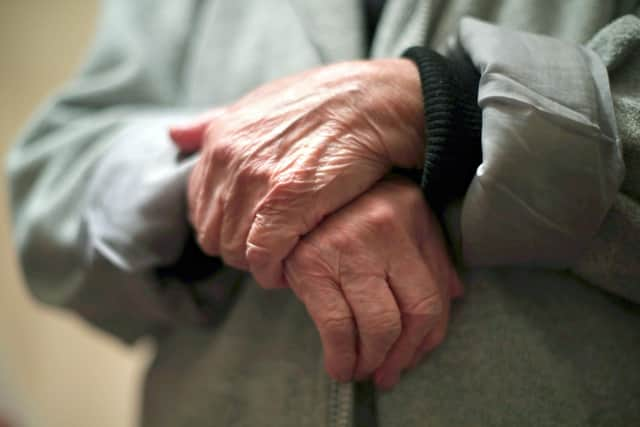Social care: People dying while waiting for care as councils and carers "have their hands tied"
and live on Freeview channel 276
At least 1,300 people died waiting for a care package to start during the last financial year.
That is according to a new study by the Shared Data and BBC Wales looking into the extent of the social care crisis in the UK. More than a decade after a crucial report found the sector had become a “postcode lottery” of provision, the study finds large disparities still exist.
Advertisement
Hide AdAdvertisement
Hide AdWhile patients can be assessed on the same day as referral in some local authorities, while the average wait is over a month in a third of the UK.


The Department for Health and Social Care said it was investing £7.5bn into social care over the next two years.
At one council in Wales, the average person waited more than 100 days just to be assessed as being eligible for support last year - then a further 10 weeks for that support to start.
As part of a wide-ranging study, we also found evidence of a domiciliary care system, where people receive help in their own home, in trouble.
Advertisement
Hide AdAdvertisement
Hide AdMore than 13,000 home-care packages were handed back to councils over the past two years - largely because companies lacked the staffing capacity to fulfil them.
Age UK said this was leaving “substantial numbers of older people” experiencing disrupted care, which it said was “distressing”.
The result of delays across the system, it said, was leaving older people dying “before ever receiving the help they need.”
Charity director Caroline Abrahams said: "If it is impossible for an older person to source home care, they may have no choice but to go into a care home.
Advertisement
Hide AdAdvertisement
Hide Ad"The choice of living at home is one that many older people hold dear, and it is a tragedy for them if they are deprived of it and forced to take up more expensive residential care instead, when they are really fit enough to go on living independently, provided they have additional support.
"None of these findings are surprising to us at Age UK and they echo what we hear from older people all the time. Too many are finding it impossible to secure the good, reliable social care they need and the root causes are insufficient money and staff in the care system.
"These are problems only government can solve and until they take decisive action to reform and invest in social care it's hard to see these figures improving. Indeed, in the face of an ageing population they are likely to get worse."
But the National Care Association (NCA) and the Local Government Association (LGA) said the system was struggling through years of under-investment.
Advertisement
Hide AdAdvertisement
Hide AdChairman, Councillor David Fothergill, added: "These figures show in the most concerning terms the human impact of the level of pressures facing our adult social care system. At its best, care and support helps people to live the lives they want to lead. But over a decade of underfunding has unquestionably weakened social care’s capacity to be the best it can be.
“Councils have their hands tied with many aspects of meeting people’s needs with not enough funding or support from government to meet the needs of their communities.
“The social care backlog is compounded by a record NHS backlog, and increasing referrals of people with mental health issues, and safeguarding needs from domestic abuse and rough sleeping. The overall picture is one of rising demand and sustained pressure on vital social care services.”
A spokesperson for the Deparment for Health and Social Care said: "Overall, waiting lists for care have reduced and there are more people working in social care. But there is more to do, which is why we’re providing up to an additional £7.5bn for social care over the next two years – including £1.4bn to help reduce adult social care waiting times, increase workforce capacity and retention as well as increase fee rates paid to adult social care providers.
Advertisement
Hide AdAdvertisement
Hide Ad“The workforce is at the centre of our ‘Next Steps to Put People at the Heart of Care’ plan and we’re investing up to £250m for the development the skills of the workforce. This is on top of our Made with Care domestic recruitment campaign and a £15m boost for recruitment of overseas care workers.”
Comment Guidelines
National World encourages reader discussion on our stories. User feedback, insights and back-and-forth exchanges add a rich layer of context to reporting. Please review our Community Guidelines before commenting.
